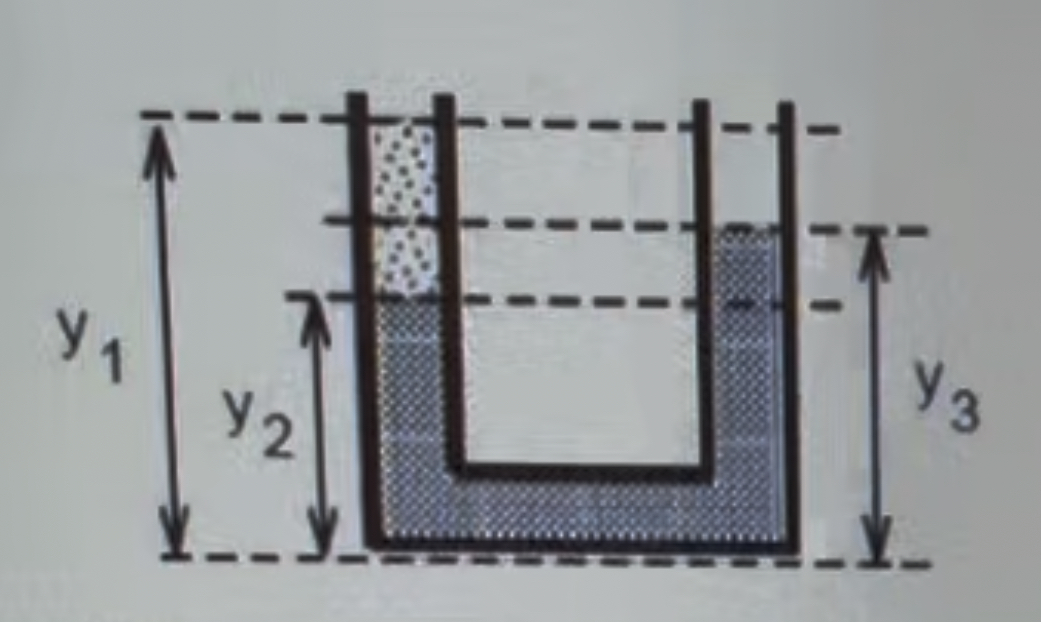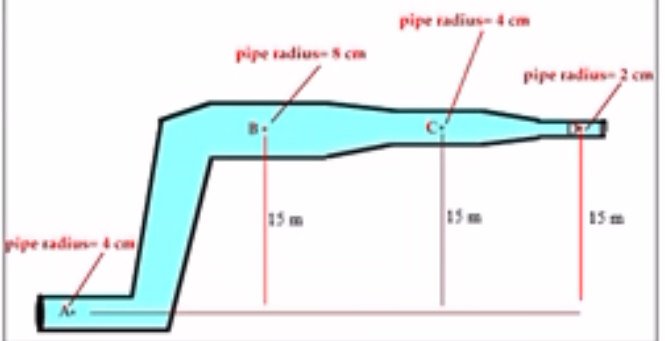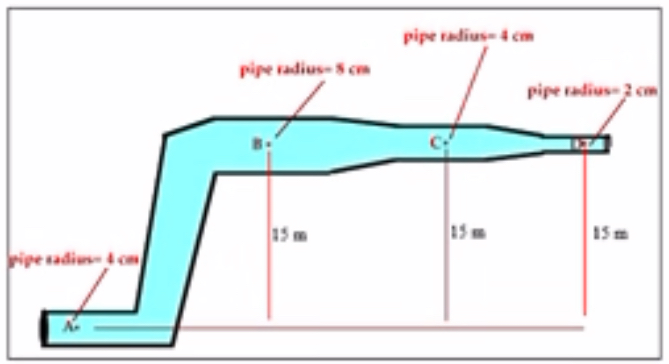Fluids Test Review
1/30
Earn XP
Description and Tags
Name | Mastery | Learn | Test | Matching | Spaced | Call with Kai |
|---|
No analytics yet
Send a link to your students to track their progress
31 Terms
A cork has weight mg and density 25% of water density. A string is tied around the cork and attached to the bottom of a water-filled container. The cork is totally immersed. Express in terms of the cork weight mg, the tension in the string
3mg
50cm³ of wood is floating on water, and 50cm³ of iron is totally submerged. Which has the greater buoyant force on it?
The iron
The apparent weight of a 600kg object of volume 0.375m³ submerged in a liquid of density 1.25×10³kg/m³ is…
1300N
A hydraulic press allows large masses to be lifted with small forces as a result of which principle?
Pascal’s
You have a couple of garden hoses connected together to water your backyard. Because you’re (as I am) a physics nerd, you put a gauge where the two hoses connect to each other. The hose ends with your sprinkler. When you put a crimp in the hose to stop water flow, you noticed that the gauge pressure registered 5.00×10³ Pa. When you release the crimp, what is the velocity of the water flowing out?
3.16 m/s

In the open manometer shown, water occupies a part of the left arm, from a height of y1 to a height of y2. The remainder of the left arm, the bottom of the tube, and the right arm to a height of y3 are filled with mercury. Which of the following is correct?
The pressure at a height y2 is the same in both arms.
The soccer team’s water cooler is a plastic cylinder 70 cm high with a 30 cm radius. A 2.0 cm diameter hole is cut near the bottom for water to flow out. This hole is plugged. What is the force on the plug due to water (density = 1000kg/m³) in the cooler when the cooler is full of water?
34 N

A fluid is forced through a pipe of changing cross-section as shown. In which section would the pressure of the fluid be a minimum?
II
A ball that can float on water has a mass 5.00 kg and volume 2.50×10-2 m³. What is the magnitude of the downward force that must be applied to the ball to hold it motionless and completely submerged in freshwater of density 1.00×10³ kg/m³
200 N
A driveway is 22.0 m long and 5.0 m wide. If the atmospheric pressure is 1.0×105 Pa, how much force does the atmosphere exert on the driveway?
1.1 × 107 N
Liquid flows through a 4 cm diameter pipe at 1.0 m/s. There is a 2 cm diameter restriction in the line. What is the velocity in this restriction?
4 m/s
A cylinder with a radius of 5.0 cm contains 15 cm of water (1000 kg/m³). Gasoline (760 kg/m³) is then poured on top until the total depth of the liquid is 45 cm. What is the gauge pressure at the bottom of the cylinder?
3704 Pa
A copper block is connected to a string and submerged in a container of water.
Position 1: The copper is completely submerged, but just under the surface of the water.
Position 2: The copper is completely submerged, mid-way between the water surface and the bottom of the container.
Position 3: The copper is completely submerged, but just above the bottom surface of the container.
Assume that the water is incompressible. What is the ranking of the buoyant forces (B) acting on the copper blocks for these positions from least to greatest?
B1 = B2 = B3
If the gauge pressure of a device reads 2.026×105 N/m³, the absolute pressure it is measuring is…
3.039×105 N/m²
A 500 N weight sits on the small piston of a hydraulic machine. The small piston has an area of 2 cm². If the large piston has an area of 40cm², how much weight can the large piston support?
10000 N
A cork has a volume of 4.25 cm³. The density of cork is 207 kg/m³. What applied force is needed t completely submerged the cork in freshwater?
0.033 N
When submerged under water, the apparent mass of one cubic meter of pure gold is 18300 kg. What would be its mass in air?
18300 kg
Find the approximate minimum mass needed for a spherical ball with a 40 cm radius to sink in a liquid of density 1.4 × 10³ kg/m³
375 kg

The pressure at A is 9.5 atm and the water velocity is 10 m/s. What is the water velocity at point C?
10 m/s
A river gradually deepens, from a depth of 4 m to a depth of 8 m as shown. The width, W, of the river does not change. At the depth of 4 m, the river’s speed is 12 m/sec. Its velocity at the 8 m depth is…
6 m/sec
A rectangular pool is 8.0 m long, 4.0 m wide, and 2.0 m high and contains kerosene with density 820 kg/m³ to a depth of 1.5 m high. Find the hydrostatic pressure on the bottom of the tank.
1.1 × 105 Pa
A conduit of radius 7R carries a uniformly dense liquid to a spigot of radius R at the same height, where it has a velocity of V. What is its initial velocity
0.02 V
The figure show an object of mass 0.4 kg that is suspended from a scale and submerged in a liquid. If the reading on the scale is 3 N, then the buoyant force that the fluid exerts is most nearly…
1.0 N

The pressure as C is…
800,000 N/m²
A block is connected to a light string attached to the bottom of a large container of water. The tension in the string is 3.0 N. The gravitational force from the earth on the block is most nearly…
8.0×10-4 m³
Salt water is more dense than fresh water. A ship floats in both fresh water and salt water. Compared to the fresh water, the amount of water displaced in the salt water is…
less.
An ideal fluid flows through a long horizontal circular pipe. In one region of the pipe, it has radius R. The pipe then widens to radius 2R. What is the ratio of the fluids speed in the region of radius R to the speed of the fluids in region with radius 2R?
4
Which of the following is the best statement of Pascal’s Law?
Pressure on a confined liquid is equally transmitted in all directions
A cork has a volume of 4.25cm³. The density of the cork is 207 kg/m³. What volume of the cork is beneath the surface when the cork floats in water (1000 kg/m³)?
8.8 × 10-7 m³
Two objects labeled K and L have equal mass but densities 0.95Do and Do, respectively. Each of these objects floats after being thrown into a deep swimming pool. Which is true about the buoyant forces acting on these objects?
The buoyant forces are equal on the objects since they have equal mass
As a rock sinks deeper and deeper into water of constant density, what happens to the buoyant force on it?
It remains constant